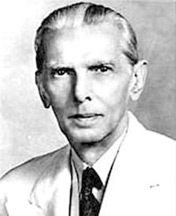|
Mohamed Ali Jinnah:
Grit and determination, his hallmark
by K.D.M. Kittanpahuwa
'Who told you the Muslim League gave us Pakistan? I brought Pakistan
with my stenographer,' a defiant Mohamed Ali Jinnah, who midwifed the
birth of Pakistan exploded into mild anger.
Aloof and arrogant, imperious in manners and brusque at times, Jinnah
in his typical English accent would address somebody as, “My dear
fellow... His boyhood name was Jinnabhai which he abandoned in later
life. He looked a typical country English gentlemen always nattily
dressed and travelled in the first class railway compartments to avoid
the masses unlike his adversary Mahatma Gandhi who chose to travel in
the third class railway carriages mingling with all sorts of people.
|

Mohamed Ali Jinnah |
For Jinnah order, discipline and hard work were top priorities. This
made him a crusader to secure freedom from the British exclusively
through constitutional means. Jinnah dismissed Gandhi's non-lethal
weapons of Satyagraha, civil disobedience and non-cooperation as ‘mere
vague and philosophical ideas'. His trademark monocle, perhaps modelled
on British Prime Minister Chamberlain, bore the imprint of an English
country squire.
Barrister
He 'baptised' himself as ‘Mr. Jinnah’ and when Gandhi addressed him
as “my dear brother”, he responded ‘Mr. Gandhi'.
A Lincoln Inn's barrister, Jinnah on his return to pre-independent
India launched his career as a ‘briefless lawyer’ and lived a Spartan
life of strict economy. Later he built his career as the most successful
lawyer in Bombay.
Victorian-era statesman Gladstone, four times British Prime Minister
and a member of Parliament for 60 long years, was Jinnah's ‘object of
admiration'.
Dr. Seyed Ahamed Khan, a brilliant lawyer was the first to inspire
Jinnah to think of a separate country for the Muslims in the
sub-continent. This jolted Jinnah to plunge headlong into the rough and
tumble of politics. Throughout his struggle for nationhood, he strictly
maintained his identity in the face of overwhelming odds.
Carving out a Pakistan from Hindu India was a formidable task since
to Mahatma Gandhi, Jawaharlal Nehru and master strategist Sardar Patel,
the motherland was sacred. They had implicit faith in the unity of India
against fissiparous tendencies and Jinnah's intransigence. The Hindu
majority failed to dispel Muslims’ fear that the Indian National
Congress was essentially a Hindu organisation. This prompted Jinnah to
consectrate himself to create a Pakistan. To some historians, it was the
communal representation as recommended by the Morely-Minto reforms, that
fostered the concept of a separate country.
Faith
Jinnah always pinned his faith in constitutional means such as
negotiations with the powerful British authorities to achieve his
promised land.
Ultimately when the British Civil servant Sir Cyril Radcliffe defined
the frontiers for Pakistan Jinnah was last, yet as a true
constitutionalist he accepted the verdict despite other Muslim leaders
protesting against the grave injustices perpetrated on the Muslims.
Jinnah was a chain smoker. His passion for newspapers was amazing
since a large part of his study had been reserved for old newspapers. He
was six-foot high weighing only 120 pounds. A non-conformist, Jinnah
spurned religious orthodoxy. There is barely any reference to the six
members his brothers and sisters of the family, save his life-long
companion, his sister Fatima. She stood by him during good and bad
times. When Gandhi once asked him how he should be addressed, he
quipped, “A rose by any other name would also smell as sweet”.
“Never was there a nature whose outer qualities provided so complete
an antithesis of its inner worth.
Languid
Tall and stately, but thin to the point of emaciation, languid and
luxurious of habit’, said the famous Indian poet and politician Sarojini
Naidu of Jinnah.
He attacked the caste system as the bane of India. Jinnah referred to
Nehru as “a literary figure who should have been an English professor,
.... an arrogant Brahmin.”
Jinnah married Ruthenbai, a Parsee of ravishing beauty. Elegant and
urbane, she was her husband's 24-year-old junior. Ruthie was called the,
“Flower of Bombay”. Vast difference of age, temperament and social life
were far apart between them and their marriage was shattered. Lonely and
embittered, Jinnah dedicated himself to the noble task of translating
his dream of creating a country for his people-the Indian Muslims.
Afflicted with pneumonia he passed away peacefully. When his doctor
said, “Sir, you are going to live, he said, “No, I am not”. |

